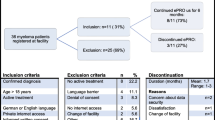Abstract
The involvement of cancer patients in symptom reporting talks into our cultural narrative of empowerment and participation in decisions in health of both patients and professionals. Electronic patient-reported outcome (ePRO) is a tool applied for use in such interaction. Based on limited evidence and few empirical studies, health systems are rapidly implementing this instrument in managing patients in active treatment and in follow-up. In a cluster randomized trial of all Danish oncology departments treating breast cancer with adjuvant chemotherapy, we applied ePRO in 347 patients consecutively recruited. Our primary outcome, which was at least one treatment adjustment, was not significantly influenced using ePRO, 34% in the ePRO arm and 41% in the usual care arm received at least one treatment adjustment, p = 0.095. Number of hospitalizations and events of febrile neutropenia were not influenced by the intervention. We believe that one of the main reasons for this finding could be the application of PRO in a well-regulated treatment setting within a public health care system where the most impacting symptomatic toxicities are already taken care off.
Trial registration: Clinicaltrials.gov identifier: NCT02996201, registered 19 Dec 2016, retrospectively registered.


Similar content being viewed by others
Data availability
The dataset used during the current study is available from the corresponding author on reasonable request.
Abbreviations
- PRO:
-
Patient-reported outcome
- ePRO:
-
Electronic patient-reported outcome
References
Di Maio M, Gallo C, Leighl NB, Piccirillo MC, Daniele G, Nuzzo F, et al. Symptomatic toxicities experienced during anticancer treatment: agreement between patient and physician reporting in three randomized trials. J Clin Oncol. 2015;33(8):910–5.
Falchook AD, Green R, Knowles ME, Amdur RJ, Mendenhall W, Hayes DN, et al. Comparison of patient-and practitioner-reported toxic effects associated with chemoradiotherapy for head and neck cancer. JAMA Otolaryngol Head Neck Surg. 2016;142(6):517–23.
Chera BS, Amdur RJ, Tepper J, Qaqish B, Green R, Aumer SL, et al. Phase 2 trial of De-intensified Chemoradiation therapy for favorable-risk human papillomavirus-sssociated oropharyngeal squamous cell carcinoma. Int J Radiat Oncol Biol Phys. 2015;93(5):976–85.
Bruner DW, Movsas B, Basch E. Capturing the patient perspective: patient-reported outcomes as clinical trial endpoints. Am Soc Clin Oncol Educ Book. 2012;139–44. https://doi.org/10.14694/EdBook_AM.2012.32.80.
Howell D, Molloy S, Wilkinson K, Green E, Orchard K, Wang K, et al. Patient-reported outcomes in routine cancer clinical practice: a scoping review of use, impact on health outcomes, and implementation factors. Ann Oncol. 2015;26(9):1846–58.
Basch E, Deal AM, Dueck AC, Scher HI, Kris MG, Hudis C, et al. Overall survival results of a trial assessing patient-reported outcomes for symptom monitoring during routine cancer treatment. JAMA. 2017;318(2):197–8.
Denis F, Basch E, Septans AL, Bennouna J, Urban T, Dueck AC, et al. Two-year survival comparing web-based symptom monitoring vs routine surveillance following treatment for lung cancer. JAMA. 2019;321(3):306–7.
Roche H, Fumoleau P, Spielmann M, Canon JL, Delozier T, Serin D, et al. Sequential adjuvant epirubicin-based and docetaxel chemotherapy for node-positive breast cancer patients: the FNCLCC PACS 01 Trial. J Clin Oncol. 2006;24(36):5664–71.
Sparano JA, Zhao F, Martino S, Ligibel JA, Perez EA, Saphner T, et al. Long-term follow-up of the E1199 phase III trial evaluating the role of Taxane and schedule in operable breast cancer. J Clin Oncol. 2015;33(21):2353–60.
Basch E, Reeve BB, Mitchell SA, Clauser SB, Minasian LM, Dueck AC, et al. Development of the National Cancer Institute’s patient-reported outcomes version of the common terminology criteria for adverse events (PRO-CTCAE). J Natl Cancer Inst. 2014;106(9):dju244.
Baeksted C, Nissen A, Pappot H, Bidstrup PE, Mitchell SA, Basch E, et al. Danish translation and linguistic validation of the US National Cancer Institute’s patient-reported outcomes version of the common terminology criteria for adverse events (PRO-CTCAE). J Pain Symptom Manage. 2016;52(2):292–7.
Pappot HBC, Knoop A, Mitchell SA, Nissen A, Johansen C. Routine surveillance for symptomatic toxicities with real-time clinician reporting in Danish breast cancer patients-Organization and design of the first national, cluster randomized trial using the patient-reported outcomes version of common terminology criteria for adverse events (PRO-CTCAE). Breast J. 2019;25(2):269–72. https://doi.org/10.1111/tbj.13204 (Epub 2019 Feb 1).
Hjollund NH, Larsen LP, Biering K, Johnsen SP, Riiskjaer E, Schougaard LM. Use of patient-reported outcome (PRO) measures at group and patient levels: experiences from the generic integrated PRO system, West chronic. Interact J Med Res. 2014;3(1):e5.
Bhatnagar B, Gilmore S, Goloubeva O, Pelser C, Medeiros M, Chumsri S, et al. Chemotherapy dose reduction due to chemotherapy induced peripheral neuropathy in breast cancer patients receiving chemotherapy in the neoadjuvant or adjuvant settings: a single-center experience. Springerplus. 2014;3:366.
Enright K, Grunfeld E, Yun L, Moineddin R, Ghannam M, Dent S, et al. Population-based assessment of emergency room visits and hospitalizations among women receiving adjuvant chemotherapy for early breast cancer. J Oncol Pract. 2015;11(2):126–32.
Absolom K, Warrington L, Hudson E, et al. Phase III randomized controlled trial of eRAPID: eHealth intervention during chemotherapy. J Clin Oncol. 2021;39:734–47.
Acknowledgements
The authors wish to thank all breast cancer patients who took part in this study.
Funding
This study was funded by the Danish Cancer Society (R113-A7084-14-S34).
Author information
Authors and Affiliations
Contributions
HP, CWB, AaN and CJ designed the study and planned the implementation with AK. NHH designed the software. HP and CWB performed the study. CWB and JC performed the statistical analysis. All authors were actively involved in interpreting the results and writing the manuscript.
Corresponding author
Ethics declarations
Conflict of interest
The authors declare no competing interests in relation to the present publication.
Ethical approval
Ethics approval for the present study was not needed due to Danish law. The study was approved by the Danish Data Protection Agency (File number, 2015-41-4190) and registered at Clinicaltrials.gov (Clinicaltrials.gov identifier NCT02996201).
Consent of participate
All participants included completed informed consent.
Additional information
Publisher's Note
Springer Nature remains neutral with regard to jurisdictional claims in published maps and institutional affiliations.
About this article
Cite this article
Pappot, H., Baeksted, C.W., Nissen, A. et al. Clinical effects of assessing electronic patient-reported outcomes monitoring symptomatic toxicities during breast cancer therapy: a nationwide and population-based study. Breast Cancer 28, 1096–1099 (2021). https://doi.org/10.1007/s12282-021-01244-x
Received:
Accepted:
Published:
Issue Date:
DOI: https://doi.org/10.1007/s12282-021-01244-x




